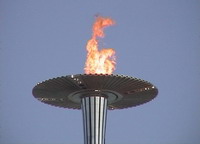Greece to light Olympic flame
After the worst wildfires, Greece is going to light a new fire - the Olympic flame.

Nine days after the worst wildfires on record obliterated forests around the birthplace of the ancient Olympic Games, scorching 2,500-year-old stone blocks, Greek officials are racing to patch up the damage by March 25 - date of the flame-lighting ceremony for the Beijing Olympics.
Culture Minister George Voulgarakis said Tuesday everything would be ready in time for the ritual, held at the World Heritage site before every Olympics since the 1936 Berlin Games.
"I believe we will meet the crucial deadline for the lighting of the Olympic Flame," he said. "We will exhaust all the means at our disposal and all our options to restore the landscape at Ancient Olympia as soon as possible - and above all to protect the area from flooding."
In a carefully orchestrated ceremony beside the Temple of Hera, an actress in the white gown and sandals of an ancient high priestess lights the Olympic flame using a concave mirror to focus the sun's heat on a silver torch.
Voulgarakis said work was under way inside the site to clear charred vegetation and conserve damaged architectural fragments - which were kept in a storage shed that burnt down.
Olympia's rich archaeological museum and ancient monuments, which include ruined temples, a gymnasium, hostels and bathhouses, survived unscathed. But the fire burnt trees in the site, some 320 kilometers (200 miles) southwest of Athens, singed the earth banks of the stadium where the ancient Games were held and obliterated swathes of forest surrounding the once-lush site.
Experts say the trees will take decades to grow back.
"Anyone who saw the extent of the devastation could only be shocked," Voulgarakis said in an interview with Athens 9.84 radio.
At least 65 people died in a spate of wildfires that swept through southern Greece from Aug. 24 to Sept. 3.
At Olympia, the flames also swept through the adjacent grounds of the International Olympic Academy, leaving buildings untouched but destroying swathes of trees - including the cypress-ringed grove where the heart of Baron Pierre de Coubertin, founder of the modern Olympic Games, is buried.
Hellenic Olympic Committee spokesman Tasos Papachristou said the marble monument enshrining Coubertin's heart was lightly scorched, but the surrounding trees were burnt.
"It's definitely not a beautiful sight right now. but efforts are under way to repair the damage," Papachristou said, adding that experts were assessing the destruction.
"We are now at the stage of reorganization," he told The Associated Press. "I don't think the damage will prevent the ceremony from taking place."
The Olympics were the most important sporting festival in ancient Greece, held every four years from 776 B.C. While the games lasted, Greece's perennially warring city-states observed a sacred truce.
After Christianity was established, Roman emperor Theodosius abolished the games in A.D. 394, deeming them pagan. The site once again hosted an Olympic event 1,610 years later, when the shot-put contest for the Athens 2004 Games was held in the ancient stadium.
Subscribe to Pravda.Ru Telegram channel, Facebook, RSS!


